Books
Books
published in 2023

Poster Photo Magazine #01
The first issue of the biannual magazine offering an heterogeneous and multifaceted exploration of approaches to modern and contemporary photography through 12 large-format wall posters, folded and detachable, with Julia Andréone, Roman Cieslewicz, Marie Quéau, Stig De Block, Area Of Work, Aurélien Froment, Fabio Mauri, Thomas Demand, Marie Deteneuille, Simon Menner, Kuba Ryniewicz, and Deborah Turbeville.

Politically Red
Sara Nadal-Melsio, Eduardo Cadava
How reading and writing are collective acts of political pedagogy, and why the struggle for change must begin at the level of the sentence.
"Reading is class struggle," writes Bertolt Brecht. Politically Red contextualizes contemporary demands for social and racial justice by exploring the shifting relations between politics and literacy.
Through a series of creative readings of Karl Marx, Rosa Luxemburg, Walter Benjamin, W. E. B. Du Bois, Fredric Jameson, and others, it casts light on history as an accumulation of violence and, in doing so, suggests that it can become a crucial resource for confronting the present insurgence of inequality, racism, and fascism. Reading between the lines, as it were, and even behind them, Cadava and Nadal-Melsió engage in an inventive mode of activist writing to argue that reading and writing are never solitary tasks, but always collaborative and collective, and able to revitalize our shared political imagination.
Drawing on what they call a "red common-wealth"—an archive of vast resources for doing political work and, in particular, anti-racist work—they demonstrate that sentences, as dynamic repositories of social relations, are historical and political events.

A Beauty Has Come
A collection of psychedelic poems inspired by Egyptian queen, Nefertiti, exploring the slippage between her image and legacy across time, place, and space.
A Beauty Has Come takes the reader on a sonic exploration across desert plains and resonant soundscapes as Nefertiti, "The Beautiful One," comes into being and Blackness on the page. Written from within the physical limitations of lockdown and informed by her work as a psychoanalytic student, Jasmine Gibson's poems are a surrealist playlist drawn from the mystic and the viscerally real. Utterly rejecting the lies and logic of capitalism, this book invites the reader to look deeply into the unconscious life of this world, before shaking it off in the spirit of resistance and joy.
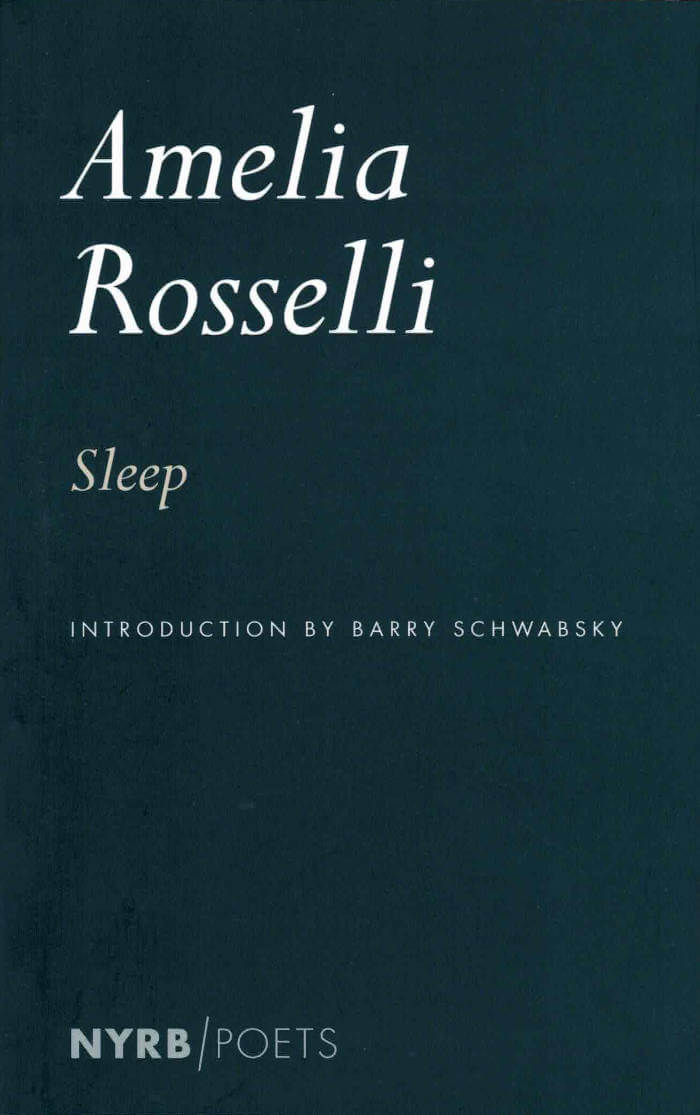
Sleep
A major, career-spanning collection of an Italian master's poetry in English, gathered together for the first time.
Amelia Rosselli is one of the great poets of postwar Italy. She was also a musician and musicologist, close to John Cage and Karlheinz Stockhausen, and she waged a lifelong battle against depression. The child of Carlo Rosselli, a significant anti-fascist intellectual who was assassinated with his brother Nello in 1937, Amelia grew up in exile and attended high school in Mamaroneck, New York. English poetry, especially the lyrics and sonnets of Shakespeare and the Elizabethans, became a prime reference for her own poetry, which combines modernist experimentation with variations on more traditional forms.
The elaborate, archaic, yet thoroughly modern poems, at once stumbling and singing, that Rosselli composed in English and gathered under the title Sleep are a beautiful and illuminating part of her work. Six of the poems were published by John Ashbery in the 1960s but have otherwise been unavailable to English readers. They are published here for the first time outside of Italy.

Nicolas Pages
An ode to mad love, awarded the Prix de Flore in 1999.
Published in 1999 and awarded that year's Prix de Flore, Nicolas Pages marks a departure from the Sadean preoccupations of Guillaume Dustan's first three novels; it is, in essence, a love story. Inspired by a failed romance with the Swiss artist-writer Nicolas Pages and collaging texts that Dustan initially produced for a wide variety of other occasions (magazine articles, short stories, project notes, shopping lists, and more), the "auto-/bio-/porno-graphic" prose of Nicolas Pages is by turns trashy and encyclopedic, corporeal and philosophical. Here Dustan inaugurates a "gay literature" that is no longer painful or shameful, but epicurean and cheerful without ever lapsing into idealism. A vibrant plea for gay rights and a tapestried text that is more than the sum of its many styles, Nicolas Pages is a call to explore the body, sexuality, and writing in all their variety; it is a hymn to life, humanity, pleasure, and desire.

Perennial Fashion Presence Falling
Latest poetry collection from poet, critic, theorist, and MacArthur fellow and Guggenheim Fellow, Fred Moten.
"...some ekphrastic evening, this'll be both criticism and poetry and failing that fall somewhere that seems like in between."
So writes poet, critic, theorist, and MacArthur fellow Fred Moten in his latest poetry collection PERENNIAL FASHION PRESENCE FALLING. Much like the poems found in The Feel Trio (Letter Machine 2014), which was a National Book Award finalist, and All That Beauty (Letter Machine, 2019), the poems here present Moten's "shaped prose" on the page and the dizzying brilliance of both polyphonies and paronomasia. Within this collection, the poems hold an innate quantum curiosity about the infinitude of the present and the ways in which one could observe the history of the future. Poems beget poems, overflowing and flowering, urging deeper etymological investigations. In perennial fashion presence falling, Moten approaches the sublime, relishing that intermediary space of microtonal thought.
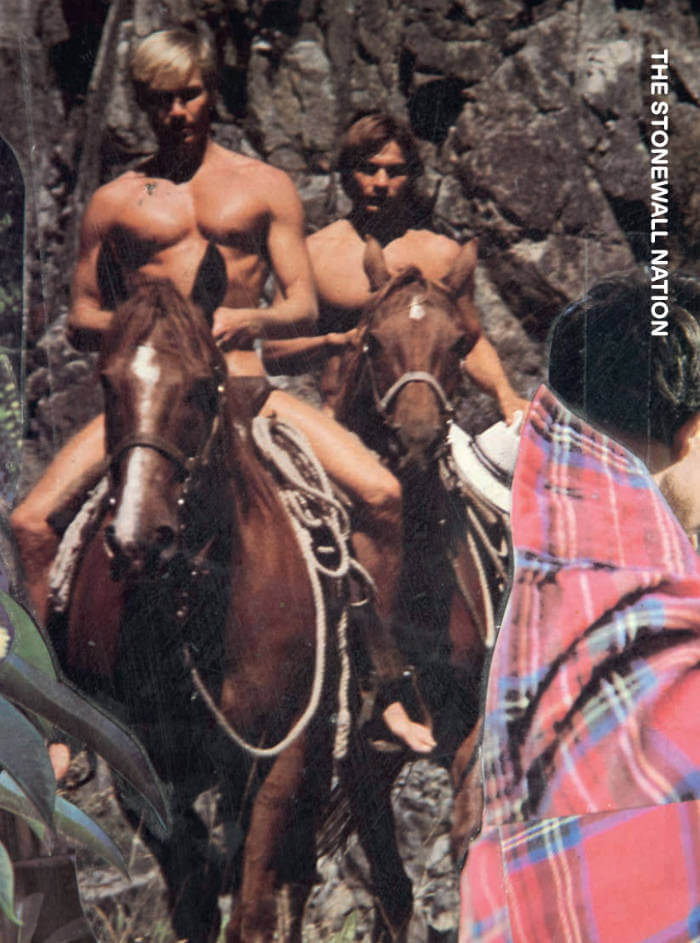
The Stonewall Nation
Edited by artist Sille Storihl, The Stonewall Nation engages the archival remains of a gay colony that a group of gay men wanted to establish in Alpine County in Northern California in the early 1970s.
The Stonewall Nation was to be a place where gay people could be free from all oppression—a city "suitable for the Gay life-style and culture." This liberation project, however, was ultimately shaped as a project of settler-colonialism: the Stonewall Nation was to be erected on Indigenous lands, the territory of the Wá∙šiw (Washoe) people. The colony was never realized, and the Stonewall Nation now lives on only in the archives.
Artist Sille Storihle first came across the story of the Stonewall Nation during a visit to the ONE National Gay & Lesbian Archives in Los Angles more than a decade ago. In 2014, they made an experimental short film about the project, which has now been extended into a publication that shares materials from Storihle's artistic process as well as the ONE Archives. Produced in connection with the Norwegian Queer Culture Year 2022, The Stonewall Nation presents archival documents, artworks and a conversation between Storihle and former ONE Archive curator David Evans Frantz, engaging and exposing marginalized histories, the "thorns" in LGBTQ history and the dirtiness of the archive.
Sille Storihle is an artist and educator based in Oslo, working primarily with moving images and printed matter. Their artistic practice encompasses a body of work in dialogue with queer archives and pasts, exploring relationships between power and performativity. From 2012 to 2020, Storihle ran the queer-feminist platform FRANK together with Liv Bugge. The platform originated as a salon, which developed into a wide range of projects in different locations with various co-curators.

Birthday
Bridget Mullen is the ruler of an unruly roost. Between 2021 and 2023, she gave birth to forty-seven paintings, each twelve-by-nine inches: kin ugly and cute, monstrous, fleshy, repulsive, droopy-eyed, and sneering as they cross the universal threshold into the no less frightening world that awaits. Birthday reunites Mullen's uncanny litter alongside a conversation between the artist and Lucas Blalock.
The paintings in New York-based artist Bridget Mullen's Birthday series utilize two distinct parameters to guide the creation of the iterative works: a vertical orientation at an intimate scale of 12 x 9 inches and a visualization of perhaps the ultimate creative act—the moment of birth. Through this consistent scale and thematic hyper focus, the artist employs endless formal variations in composition, color, and paint application. The result is a series of paintings that share a common structure yet champion individuality.
Contrasting colors provoke a visible tension, one that is at times compressed and, in other moments, elastic. Suddenly, abstract shapes come into focus as human anatomies, capable of expressing emotion. Undulating lines of various thicknesses and layered colors squeeze together, revealing peculiar faces and gestures that emerge from a central point. The repetition of thin lines creates a visual stutter of pigment, alluding to the passage of time or rapid movement.
The works in Birthday build on Mullen's practice, combining color, decisive mark-making, intuition, and experimentation to conjure psychedelic configurations. Sculptural dimensionality and flatness, representation and abstraction, and solidity and fluidity, serve not as dichotomies within these works, but as two complementary halves of a whole. Together, the forms and figures of the Birthday series are imbued with a sense of life, pregnant with agency and potential.
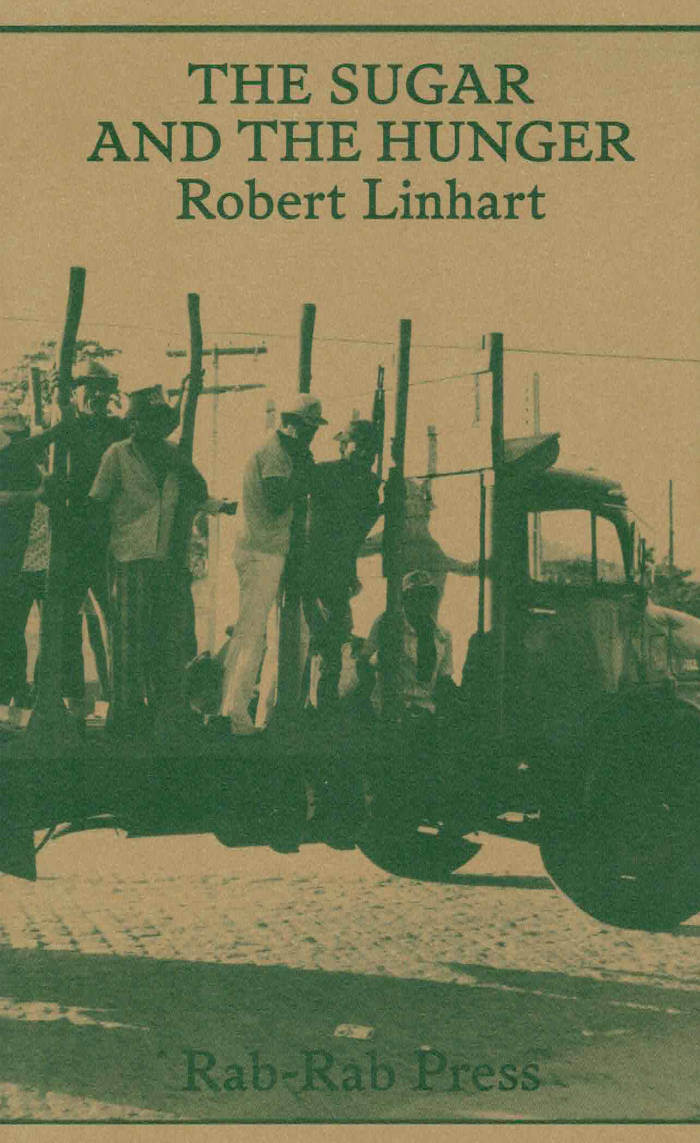
The Sugar and the Hunger
The first English language translation of Robert Linhart's The Sugar and the Hunger, originally published in 1980. Includes afterword by Luiz Renato Martins, and other materials.
Widely acclaimed for his engaged social analyses of proletariat and peasant struggles around the world, Linhart's inquiry into the sugar regions of North-Eastern Brazil, juxtaposes heterogeneous traits of the impoverished workers' stories into a vivid cinematic montage.
Alongside the translation, the book also includes 'The Third World, Investigations, Social Analysis', an unpublished interview with Linhart from 1980 made by Jean Copans, giving an insight into the political and theoretical background of his investigation in Brazil.
The afterword by Luiz Renato Martins, an active Brazilian Marxist art historian and journalist, further contextualises the importance of Linhart's book. Renato Martins who recently directed a documentary film Conversations With Robert Linhart discusses The Sugar and the Hunger against the backdrop of today's world where the practices of expropriation of land and food from peasants and urban poor, which Linhart examined in 1980 on a laboratory-like scale, have now become common global practices, endlessly producing legions of uprooted and hungry refugees.
Translated by John M Floyd and Emilio Sauri, the book includes rare photographs taken by François Manceaux in Northeastern Brazil in 1979.
Robert Linhart (born 1944 in Ixelles) is a French sociologist, philosopher and political activist, known as one of the founders of the Maoist movement in France, most famously for his 1978 autobiographic book L'Établi.

Bad Infinity – Selected Writings
The most significant critical, theoretical, and art historical texts by the artist, writer, and filmmaker Aria Dean.
Compiled here for the first time, the selected writings of Aria Dean mount a trenchant critique of representational systems. A visual artist and filmmaker, Dean has also emerged as one of the leading critical voices of her generation, through a body of writing that maps the forces of aesthetic theory, image regimes, and visibility onto questions of race and power. Dean's work across media has long been defined by what she calls a "fixation on the subject and its borders," and the texts collected here filter that inquiry through digital networks, art history, and Black radical thought. Equally at home discussing artists who embrace difficulty—from Robert Morris to David Hammons, Lorna Simpson, and Ulysses Jenkins—and conceptual frameworks such as Afropessimism, Dean often contends with how theoretical positions brush against the grain of lived reality: how the Structuralism handed down from the academy, for instance, can be co-mingled with critiques of structural racism, or how Georges Bataille's notion of base matter transforms through an encounter with Blackness.
Dean's thinking embraces a definition of "Black art that luxuriates in its outside-the-world-ness," as she writes in this volume, which works to elucidate "Blackness's proclivity for making and unmaking its own rules as it produces objects" of cultural necessity. Originally published in November as well as in Texte zur Kunst, e-flux journal, and in exhibition contexts, the essays compiled in Bad Infinity were written over a six-year span that charts our rapidly evolving forms of subjectivity and sociality.
Aria Dean (born 1993 in Los Angeles ) is an American artist, critic, writer and curator. Her writings have appeared in various art publications including November (of which she is a founding editor), Texte zur Kunst, Artforum, e-flux, The New Inquiry, Art in America, Topical Cream, Cura., Mousse, Flash Art, Spike, etc.
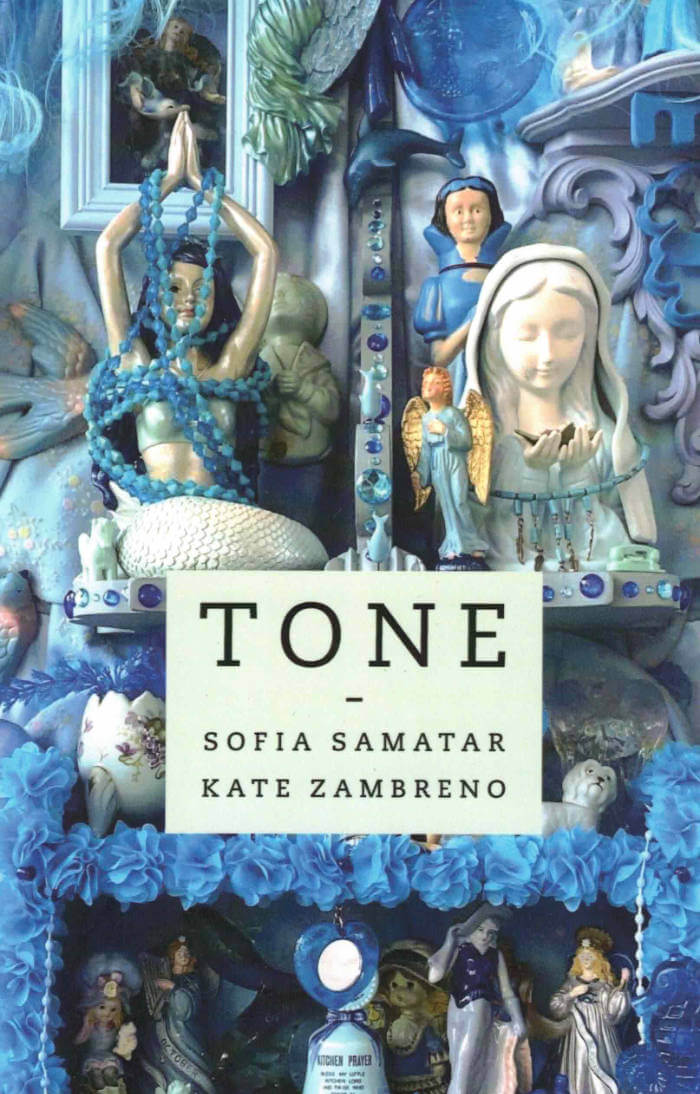
Tone
Tone is a collaborative study of literary tone, exploring its implications for community, politics, and ecology.
Both granular and global, infusing a text with feeling, tone is so difficult to pin down that responses to it often take the vague form of "I know it when I see it." In Tone, a cooperative authorial voice under the name of the Committee to Investigate Atmosphere begins from the premise that tone is relational, belonging to shared experience rather than a single author, and should be approached through a communal practice. In partnership, the Committee explores the atmospheres emanating from texts by Nella Larsen, W. G. Sebald, Heike Geissler, Hiroko Oyamada, Mieko Kanai, Bhanu Kapil, Franz Kafka, Renee Gladman, and others, attending to the chafing of political irritation, the hunger of precarious and temporary work, and the lonely delights of urban and suburban walks.
This study treats a variety of questions: How is tone filtered through translation? Can a text hold the feelings that pass between humans and animals? What can attention to literary tone reveal about shared spaces such as factories, universities, and streets and the clashes and connections that happen there? Searching and conversational, Tone seeks immersion in literary affect to convey the experience of reading-and living-together.
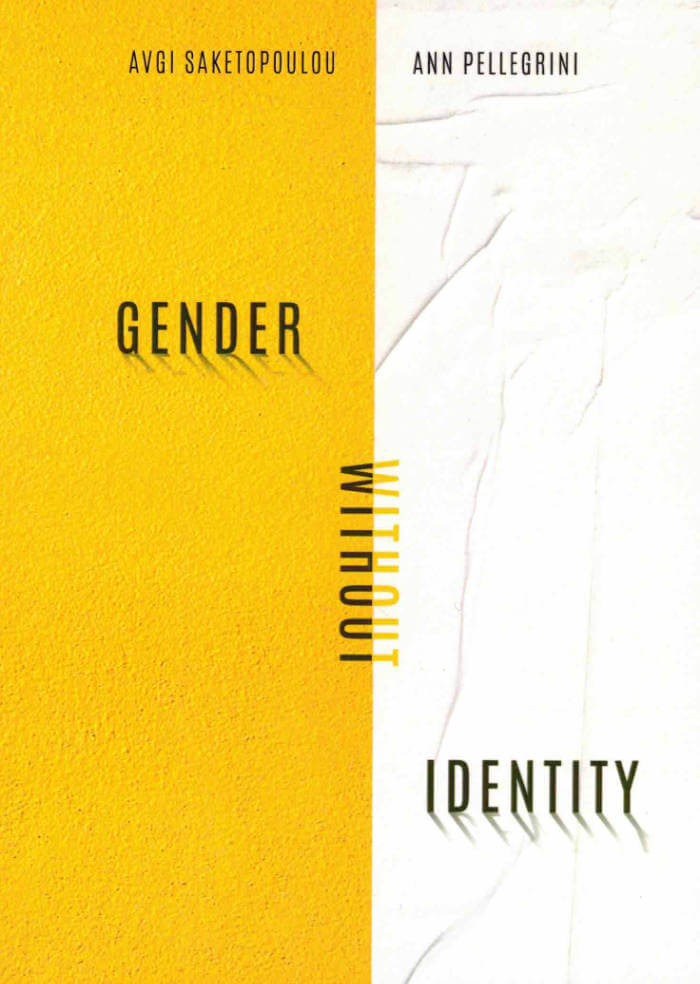
Gender Without Identity
Avgi Saketopoulou, Ann Pellegrini
Gender Without Identity offers an innovative and at times unsettling theory of gender formation. Rooted in the metapsychology of Jean Laplanche and in conversation with bold work in queer and trans studies, Avgi Saketopoulou and Ann Pellegrini jettison "core gender identity" to propose, instead, that gender is something all subjects acquire — and that trauma sometimes has a share in that acquisition. Conceptualizing trauma alongside diverse genders and sexualities is thus not about invalidating transness and queerness, but about illuminating their textures to enable their flourishing.
Written for readers both in and outside psychoanalysis, Gender Without Identity argues for the ethical urgency of recognizing that wounding experiences and traumatic legacies may be spun into gender. Such "spinning" involves self-theorizations that do not proceed from a centered self, but are nevertheless critical to psychic autonomy. Saketopoulou and Pellegrini draw on these ideas to offer clinical resources for working with gender complexity and for complexifying (what is seen as) gender normativity.
Avgi Saketopoulou is a psychoanalyst in private practice in NYC, and a member of the faculty at New York University's Postdoctoral Program in Psychotherapy and Psychoanalysis. She is the author of Sexuality Beyond Consent: Risk, Race, Traumatophilia from the Sexual Cultures Series, NYU Press.
Ann Pellegrini is Professor of Performance Studies & Social and Cultural Analysis at New York University, and a practicing psychoanalyst. Their books include Performance Anxieties: Staging Psychoanalysis, Staging Race and Love the Sin: Sexual Regulation and the Limits of Religious Tolerance (coauthored with Janet R. Jakobsen).

Oral History of Exhibitions
Of course there is the practice of art by the artist, but an exhibition is even more so an engagement between people, places, institutions, projections, desires, coincidences, memories, and temporalities. In this monograph, artist Megan Francis Sullivan chooses the format of oral history, engaging various akteurs of the field to produce a web of language reflecting a shape of time.
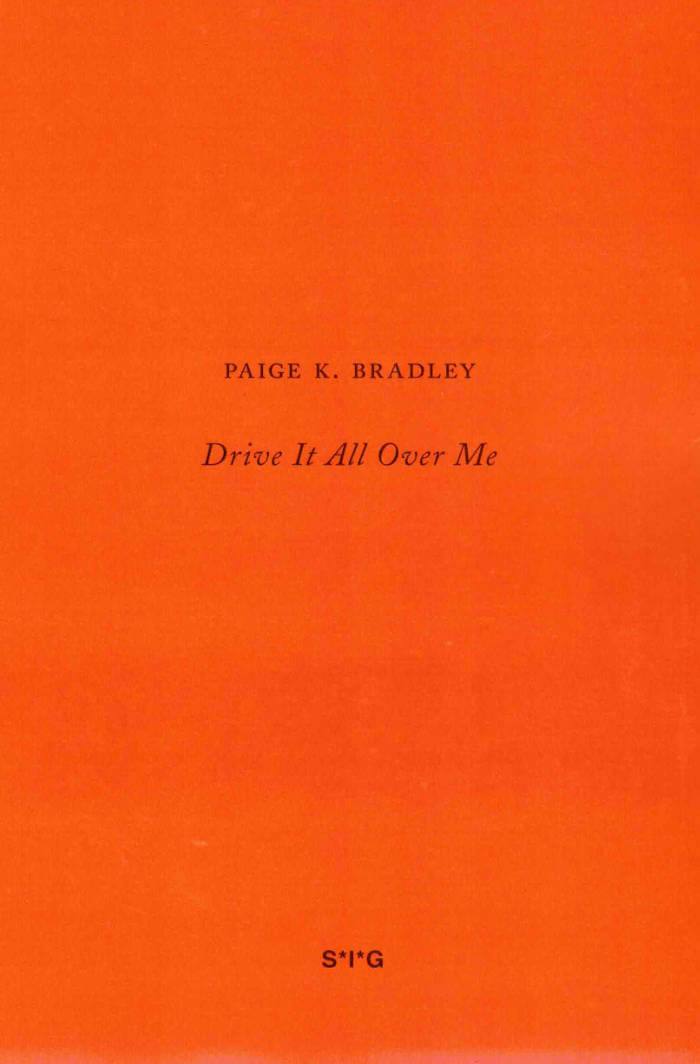
Drive It All Over Me
Paige Bradley’s Drive It All Over Me was commissioned by the artists Jay Chung and Q Takeki Maeda and concerns their work Bad Driver, 2023, Jack Goldstein’s Selected Writings, and Vanessa Place’s Gone with the Wind and concerns broad themes of subtextual narrative, authorship, and identity in text-based visual artworks while also touching upon allegory, elaborately subtle jokes, and writing as a sculptural material.

Lavskrift
Lavskrift is an edition written using signs collected from script lichen (graphis scripta). The species grows in shady deciduous forest and has small, black structures that resemble writing characters.
In the book Stahle explores asemic writing: writing where the signs have no reference to a known sound or meaning.
Edition: 300 numbered copies
Printed in Sweden by ByWind
Letterpress printed cover
Open spine binding with black thread

Meriem Bennani: Life on the Caps
Meriem Bennani's Life on the CAPS is the final chapter in her film trilogy of the same name. Set in a supernatural, dystopian future surrounding a fictional island in the middle of the Atlantic Ocean, it is rooted in Bennani’s research and reflections on the histories of island societies, biotechnology, and vernacular music. Layering live-action footage and computer-generated animation, Bennani intuitively adapts editing techniques that evoke documentary film, science fiction, phone footage, music videos, and reality TV. Her one-person exhibition at the Renaissance Society marked the debut of this personal, electric yet melancholic consideration of what it is to live in a state of limbo, and this accompanying book captures the film through a combination of still images and selections from a transcript of the film.
This volume includes essays by Emily LaBarge and Elvia Wilk and transcripts of conversations between Meriem Bennani and: Omar Berrada; Fatima Al Quadiri, Negar Azimi, and Tiffany Malakooti; Amal Benzekri; and Aziz Bouyabrine.

CCA Wattis Institute for Contemporary Arts
Cecilia Vicuña: Word Weapons
This book brings together the Palabrarmas series by the artist, poet, and activist Cecilia Vicuña (b. 1948, Santiago, Chile). A neologism that translates to “word weapons” or “word arms,” Palabrarmas imagine new ways of seeing language. By taking the form of collages, silkscreens, drawings, poems, fabric banners, cut-outs, mixed media installations, and street actions, Vicuña brings together many aspects of her practice in poetry, activism, and visual art, allowing new meanings to emerge. This book presents a range of palabrarmas, created over the past four decades, in color for the first time.
Cecilia Vicuña is an artist, poet and activist currently based between New York and Santiago.
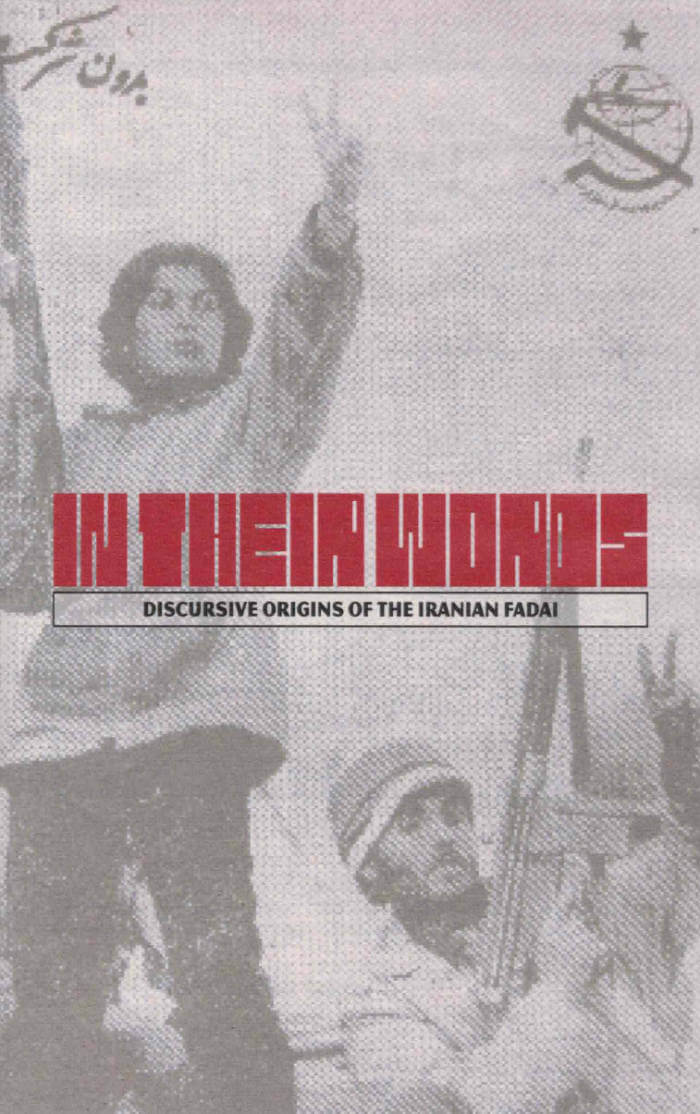
In Their Words: Discursive Origins of the Iranian Fadai
The People’s Fadai (literally, “self-sacrificers”) were a prominent Marxist-Leninist guerrilla organization in Iran. The Fadai emerged in the 1960s from a diffuse movement advocating for armed struggle, in response to the monarchic regime’s increasingly violent crackdowns against all forms of dissent. Many of these original guerrilla groups were dismantled by the secret police, known as the SAVAK, before they had the chance to launch any actual militant actions.
This zine examines a selection of texts influential to or produced by the Fadai. Gradually, their period of study produced original theoretical works that would inform the guerrilla resistance in Iran. Over the course of a decade and a half, these works culminated in the radical newspaper Kar, which is still in publication today. Despite decades of militant leftist publishing and revolutionary movement, Iranian communist thought remains removed from much of the wider Marxist canon.

Zong! (Fifteenth anniversary edition)
A haunting lifeline between archive and memory, law and poetry.
In November 1781, the captain of the slave ship Zong ordered that some 150 Africans be murdered by drowning so that the ship’s owners could collect insurance monies. Relying entirely on the words of the legal decision Gregson v. Gilbert – the only extant public document related to the massacre of those African slaves – Zong! tells the story that cannot be told yet must be told. Equal parts song, moan, shout, oath, ululation, curse, and chant, Zong! excavates the legal text. Memory, history, and law collide and metamorphose into the poetics of the fragment. Through the innovative use of fugal and counterpointed repetition, Zong! becomes an anti-narrative lament that stretches the boundaries of the poetic form, haunting the spaces of forgetting and mourning the forgotten.
Fifteenth anniversary edition, with a new preface by the author and contributions by Katherine McKittrick and Saidiya Hartman.

After Sex
Who decides what happens after sex? The last decade has seen many significant changes to the laws governing women’s reproductive rights around the world, from liberalisation in Ireland to new restrictions in the USA. After Sex offers personal and political perspectives from the mid-20th century to the present day, setting feminist classics alongside contemporary accounts. These essays, short stories and poems trace the debates and tell the stories; together, they ask us to consider what reproductive justice might look like, and how it could reshape sex.
The writers pay special attention to people — both fictional and real — who have sought control over their sexual lives, and the joy, comedy, difficulties and disappointments that entails. But above all, After Sex testifies to the power of great writing to show us why that freedom is worth pursuing — without shame and without apology.
With contributions from:
Lauren Berlant, Joanna Biggs, Edna Bonhomme, Gwendolyn Brooks, Beverley Bryan, Stella Dadzie and Suzanne Scafe, Storm Cecile, Lucille Clifton, Rachel Connolly, T.L. Cowan, ’Jane Does’, Maggie Doherty, Nell Dunn, Andrea Dworkin, Anne Enright, Deborah Friedell, Tracy Fuad, Kristen Ghodsee, Vivian Gornick, Donna Haraway, bell hooks, Barbara Johnson, Jayne Kavanagh, Lisa Hallgarten and Angela Poulter, Jamaica Kincaid, Patricia Knight, R.O. Kwon, Ursula K. Le Guin, Natasha Lennard, Sophie Lewis, Audre Lorde, Amelia Loulli, Erin Maglaque, Holly Pester, Adrienne Rich, Denise Riley, Sally Rooney, Loretta J. Ross, Madeleine Schwartz, SisterSong, Sophie Smith, Annabel Sowemimo, Amia Srinivasan, Keeanga-Yamahtta Taylor, Judith Jarvis Thomson, Alice Walker and Bernard Williams.
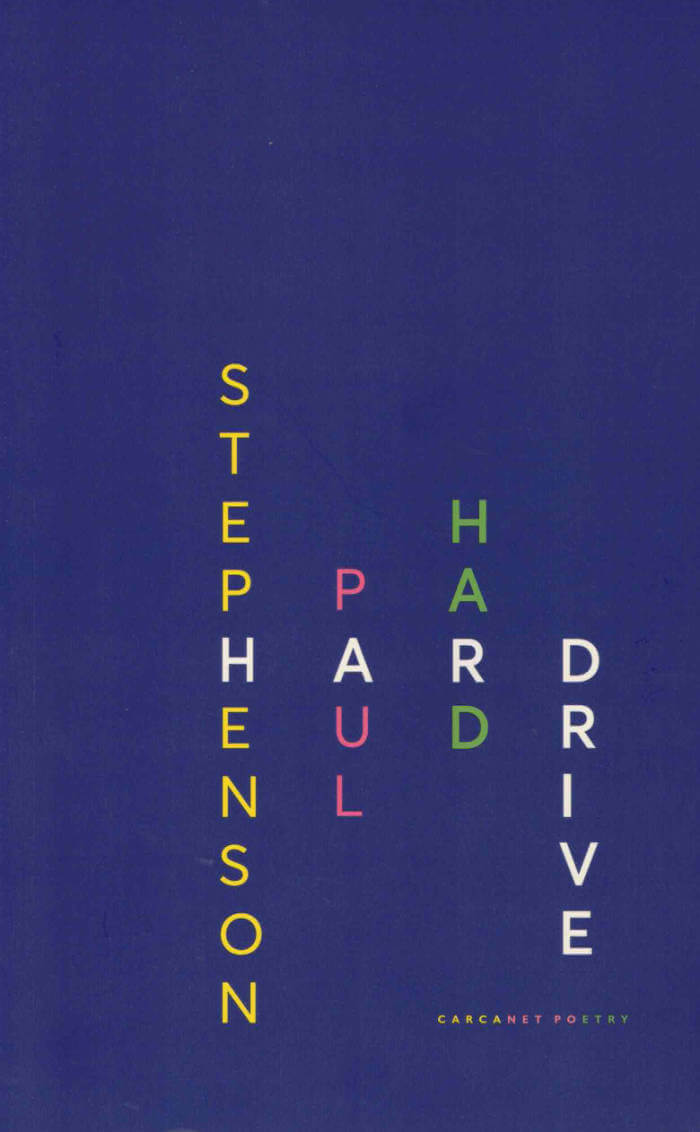
Hard Drive
When his partner suddenly died, life changed utterly for Paul Stephenson. Hard Drive is the outcome of his revisiting a world he thought he knew, but which had been upended. In poems that are affectionate, self-examining, sometimes funny and often surprised by grief in the oddest corners, the poet takes us through rooms, routines, and rituals of bereavement, the memory of love, a shared life and separation. A noted formalist, with a flair for experiment, pattern and the use of constraints, Stephenson has written a remarkable first book, moving and, despite everything, a hopeful record of a gay relationship. It is also a landmark elegy collection.
Paul Stephenson studied modern languages and linguistics. He has published three pamphlets: Those People (Smith/Doorstop, 2015), which won the Poetry Business pamphlet competition; The Days that Followed Paris (HappenStance, 2016), written after the November 2015 terrorist attacks; and Selfie with Waterlilies (Paper Swans Press, 2017). In 2013/14 he took part in the Jerwood/Arvon mentoring scheme and the Aldeburgh Eight, before completing an MA in Creative Writing (Poetry) with the Manchester Writing School. In 2018 he co-edited the ‘Europe’ issue of Magma (70) and currently co-curates Poetry in Aldeburgh. He is a university teacher and researcher, and lives between Cambridge and Brussels.

Border Wisdom
In his second book of poems, Ahmad Almallah seeks a language that captures the afterlives of the mother tongue. This collection blurs the borders between languages, between the living and the dead, between presence and absence.
The poems of Border Wisdom break and mourn physical borders at the same time. Here the exilic idea of a return to a home is expressed in the daily return to the blank page in search of a poem. In these returns the body brushes against the past and, as Hart Crane puts it, taps into "that memory all things nurse."
"In Border Wisdom, Ahmad Almallah takes the notable step of writing in a mix of Arabic and English scripts, a bilingual poetics that has surfaced intermittently among the finest of our experimental writers. For this and for his exemplary writings in standalone English, I would extend to him the well-known welcome that Emerson directed to Whitman nearly two centuries ago: I greet you at the beginning of a great career."—Jerome Rothenberg
Ahmad Almallah grew up in Bethlehem, Palestine and currently lives in Philadelphia where he is an artist-in-residence in Creative Writing at the University of Pennsylvania. His first book of poems, Bitter English, was published in the Phoenix Poets Series from the University of Chicago Press in 2019. He received the 2018 Edith Goldberg Paulson Memorial Prize for Creative Writing, and his sequence of poems “Recourse,” won the 2017 Blanche Colton Williams Fellowship. His poems have appeared in Jacket2, Track//Four, All Roads Will Lead You Home, Apiary, Supplement, SAND, Michigan Quarterly Review, Making Mirrors: Righting/Writing by Refugees, Cordite Poetry Review, Birmingham Poetry Review, American Poetry Review, and Poetry, among others.
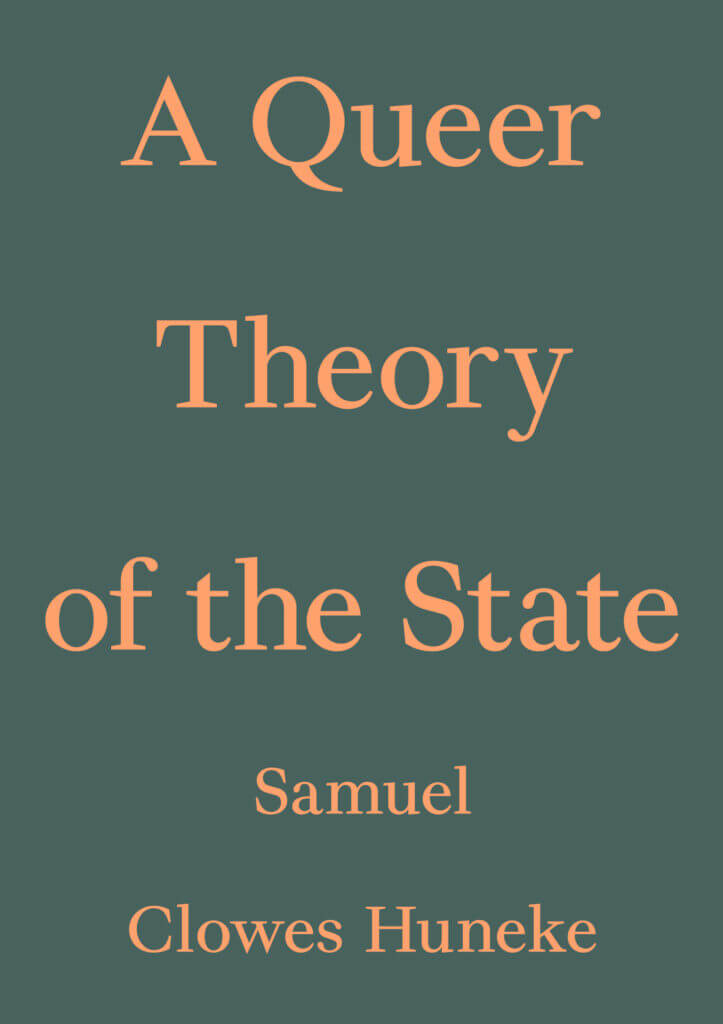
A Queer Theory of the State
How queer theory can wed its critically anti-normative impulses to the empirical need for a state.
Queer theory has often been hesitant to align itself with a politics of the state, approaching it with a negative or pragmatic framework. A Queer Theory of the State offers a more optimistic perspective. Rather than eschew engagement with democratic theorizing, the historian Samuel Clowes Huneke asks how queer theory can wed its critically anti-normative impulses to the empirical need for a state. In answering this question, Huneke shows how the state is an integral component of a politics that seeks to subvert and undo the oppression of queer lives.
Samuel Clowes Huneke is assistant professor of history at George Mason University. His first book, States of Liberation: Gay Men Between Dictatorship and Democracy in Cold War Germany (2022), won the Charles E. Smith Award for best book in European History from the European History Section of the Southern Historical Association. Huneke has written for Boston Review, the Washington Post, The Point, and the Los Angeles Review of Books.

mnemotope issue 002
This second edition features pieces from 40 contributors that range from soup recipes to poetic essays to drawings to music recommendations to a screenplay and beyond.